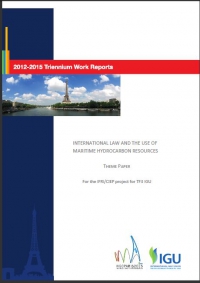International Law and the Use of Maritime Hydrocarbon Resources

Published by Clingendael International Energy Program (CIEP)
In the “New Dimensions of Geopolitics and Natural Gas”, both opportunities for and hindrances to the development of the natural gas business are emphasised, in the context of new geopolitical realities. Sometimes opportunities and hindrances have regional or local origins, while other times wider geopolitical issues play a role. Opportunities arise from settling potential disputes over cross-border deposits in an amicable manner, while also in situations where disputes have already flared up remedies can be found on political or legal grounds. In this topical paper the focus is on remedies offered by international law regarding maritime hydrocarbon resources.
Currently, disputes among coastal states about sovereignty over maritime hydrocarbon resources in the South China Sea, the East China Sea, and the Eastern Mediterranean Sea regularly feature in news headlines. In the Persian/Arabian Gulf as well, delimitation issues remain outstanding. But also in other areas, delimitations of exclusive economic zones have had to be settled before the expansion of offshore production could ensue. International law often offers solutions to coastal states, but sometimes countries do not accept the outcome for historic or geopolitical reasons and/or refuse to go to arbitration. In these situations other solutions are often found, such as joint production. The agreement between Norway and Russia is an example of a bilateral agreement in which two states settled their dispute amicably and opened up the potential for hydrocarbon exploitation in the previously contested area. Other examples attest to similar conflict resolution successes among states that wish to embrace their offshore hydrocarbon potential.
In some cases wider geopolitical and economic interests get in the way of finding a workable solution. The attempts of the coastal states of the South China Sea to come to a multilateral solution has so far not been embraced by China; China prefers bilateral agreements with individual states. The asymmetry in strategic and economic power between China and the other coastal states may play a role in this.
Although outstanding disputes over maritime hydrocarbon exploitation are often analysed within their geopolitical context, it is important to also look at the potential solutions that can be achieved through international law. Together with the other topical papers, this paper offers a wider perspective on the context of the international gas business.

Contenu disponible en :
Régions et thématiques
Utilisation
Comment citer cette publicationPartager
Téléchargez l'analyse complète
Cette page ne contient qu'un résumé de notre travail. Si vous souhaitez avoir accès à toutes les informations de notre recherche sur le sujet, vous pouvez télécharger la version complète au format PDF.
International Law and the Use of Maritime Hydrocarbon Resources
Centres et programmes liés
Découvrez nos autres centres et programmes de rechercheEn savoir plus
Découvrir toutes nos analysesQuels instruments financiers pour renforcer la résilience des chaînes de valeur des métaux critiques et le stockage stratégique ?
Les chaînes de valeur des matières premières critiques sont plus vulnérables que jamais et des secteurs industriels vitaux en Europe sont désormais menacés si leurs approvisionnements ne sont pas sécurisés par des mesures stratégiques et urgentes, compte tenu de l'intensification des confrontations géopolitiques, du nationalisme en matière de ressources, de la demande croissante et de l'augmentation limitée de l'offre.
L'UE en état d'alerte : priorité sur les enjeux énergétiques et industriels pour 2026
L'année 2025 a confirmé qu'il était nécessaire de se préparer à un environnement géoéconomique et géopolitique plus difficile, car l'intensité et la fréquence des chocs augmentent, tandis que l'Union européenne (UE) n'a plus de flancs stables, dans un contexte de fréquentes crises avec les États-Unis, révélatrices d’une fracture systémique.
De l'IRA à l'OBBA : les entreprises françaises de l'énergie aux États-Unis
Adopté en 2022 sous l’administration Biden, l’Inflation Reduction Act (IRA) a marqué un tournant historique dans la politique énergétique américaine, offrant une visibilité supposée de long terme et attirant les investissements. De 2022 à 2024, les investissements américains dans les énergies propres ont atteint près de 500 milliards de dollars (+ 71 % en deux ans).
Le rôle clé de la Chine dans les chaînes de valeur des minerais critiques
La Chine occupe aujourd’hui une position dominante dans les chaînes de valeur des minerais critiques, de l’extraction à la transformation jusqu’aux technologies en aval. Cette suprématie repose sur des décennies de politiques industrielles et lui confère une influence stratégique considérable sur la sécurité d’approvisionnement mondiale, notamment pour l’Union européenne.













